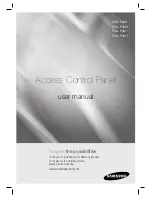
11 MAINTENANCE
11.1 Maintenance instructions and warnings
•
Once the automation has been tested, the parameters set must not be altered. If further adjustments (e.g. alterations to the voltage value) are made, ALL THE CHECKS REQUIRED FOR
TESTING AND COMPLIANCE WITH STANDARDS MUST BE REPEATED.
•
The Manufacturer declines responsibility for damage or injury caused by non-compliance with the information provided in this manual and the safety instructions provided below.
•
The Manufacturer declines all responsibility for damage and malfunctions deriving from non-compliance with the maintenance instructions.
•
In order to keep the operator efficient and safe, follow the cleaning, checking and routine maintenance procedures as described in this manual. This is the owner’s duty.
•
Any checking, maintenance or repair work must be conducted by a PROFESSIONAL FITTER
•
Always switch off the electricity supply in the event of malfunctions, breakdowns and before any other operations in order to avoid the gate from being activated.
•
Always disconnect the operator’s power supply before performing any maintenance or cleaning operation.
•
The owner is NOT authorised to remove the control unit cover as it contains live parts.
•
If the power cable is damaged, it must be replaced by the Manufacturer or its technical Assistance service or in any case a person with a similar qualification in order to avoid risks.
• If the power cable is damaged, it must be replaced by the Manufacturer or its technical Assistance service or in any case a person with a similar qualification in order to avoid risks.
• Do not perform technical or programming modifications on the control unit. Operations of this type may cause malfunctions and/or risk of accidents. The manufacturer declines all responsibility for
damage caused by products that have been modified.
• In the event of intervention of automatic or fuse switches, before restoring function conditions identify and eliminate the fault. Request the intervention of a PROFESSIONAL FITTER.
• The disconnection and replacement of the pair of buffer batteries (optional) may be performed by a PROFESSIONAL FITTER only.
• If a fault that cannot be solved following the information contained in the present manual arises, contact the manufacturer’s assistance service.
• All maintenance, repair or replacement of parts must be recorded in the maintenance log, which is SUPPLIED AND INITIALLY FILLED IN BY THE FITTER.
11.2 Routine maintenance
Every 6 months a PROFESSIONAL FITTER should repeat the series of tests described for automation testing (see INSTALLATION MANUAL – TESTING AND TRIAL RUN Chap. ). – TESTING AND
TRIAL RUN Chap.).
12 DEMOLITION AND DISPOSAL
• The control unit is constructed using various materials, which implies the adoption of different disposal procedures. Refer to regulations in force in the country in which the automation is installed,
especially with regard to the buffer batteries (if present).
• If present the batteries must be removed from the control unit prior to disposal. Disconnect the control unit from the electricity supply before removing batteries.
• Contact qualified firms for disposal.
ATTENTION: operator disconnection from the mains supply must be performed by a qualified electrician using suitable tools.

































